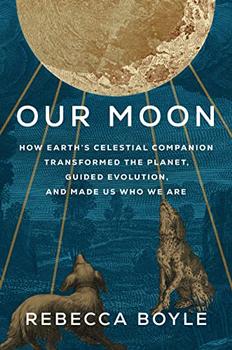Summary | Excerpt | Reviews | Beyond the Book | Readalikes | Genres & Themes | Author Bio
How Earth's Celestial Companion Transformed the Planet, Guided Evolution, and Made Us Who We Are

 Book Reviewed by:
Book Reviewed by:
Christine Runyon
Buy This Book
Chapter One
A World Apart
The Moon is different.
It is like nowhere on Earth, which is a watery bubble improbably bursting with life in a universe of emptiness. The Moon is barren and has been throughout the four-and-a-half-billion-year eternity of its companionship with this planet. The Moon is silent. It plays host to no cricket chorus, coyote calls, or night wind sailing through pines. It is dry, at least on the outside. There are no waves lapping on shores, no soft rains, no snow. It is a crater-pocked wasteland that smells of doused firecrackers. The Moon is scorching hot during its long day, and freezing cold during its long night.
The lunar landscape is grayscale, but flecked with shades of tan, chocolate, beach sand, chalk, gold, spicy-mustard ochre, and, in the words of Apollo 11 astronaut Michael Collins, a "cheery rose" hue.
Sunlight on the airless Moon plays tricks on human eyesight, warping a moonwalker's sense of crater depths and hillside angles, making tiny slopes look like vertiginous peaks. All is monotony. There is no blue, and there is no green. No sunlight scatters through a watery atmosphere. No lichens splotch the Moon's rocks. No bacteria grow in its dirt to help plants flourish. Certainly, there are no birds overhead, ants underfoot, or any other kind of animal anywhere. On the Moon there is nothing and no one. Until the Apollo landings, no creatures ever looked up at the Moon's black sky and wondered about their place in it all. No one ever stared up at the crescent Earth and thought about visiting. There is no culture, except the one we brought.
The Moon says nothing for itself, but it says plenty about us. We project our dreams and our fervor onto its mottled surface and it serves as a mirror, both figuratively and literally. It reflects sunlight and even Earth's own light, ashen earthshine, back to us. We can see this phenomenon when the Moon is a crescent, and yet its full disk is just barely perceptible. The Moon is Earth in inverse, a desolate rock whose scars whisper of our world's violent past and underscore its riotous gardens of color and life. The Moon contains only what we imagine it to contain. It harbors only what we berth in its seas.
Since the beginning of time, the Moon has controlled life on Earth and shepherded the human mind through a spectacular journey of thought, wonder, power, knowledge, and myth. But this frenzied, multifarious, Earthly history disguises the truth of the Moon. As vivid and lively as our history with it has been, the Moon itself is quiet, barren, and still.
This was not always the case: When the Moon was young, it was livid with energy and heat, a magnetic field, oceans of lava, and maybe an active crust like the one that warps and wrinkles the face of our world. But no one was around for this lively phase. The only Moon we have ever known is the spectral one in our sky, the two-dimensional one, the cold and silent one.
Nothing happens there, except the occasional arrival of an asteroid or the briefly violent puff of a crashed or landed spacecraft. Nothing looks up, nothing breathes, nothing hopes.
When Apollo 11 astronaut Buzz Aldrin walked on the Moon in 1969, he described his surroundings as "magnificent desolation," an interpretation that has yet to be bested. It's difficult to liken the Moon to anywhere familiar, because anywhere familiar is a place on Earth.
Even from orbit, Earth looks and feels like home. Astronauts report that staring down on our planet is one of the most exhilarating things about being in space. We belong here. Earth's razor-thin atmosphere, cloud tendrils, green-carpeted continents, and deep ocean blues beckon us. Not so for the Moon, according to Collins, who orbited it alone in his spacecraft but did not walk on it. There is no comfort to the "withered, sun-seared peach pit out my window," he wrote in his memoir, Carrying the Fire. "Its invitation is monotonous and meant for geologists only."
Excerpted from Our Moon by Rebecca Boyle. Copyright © 2024 by Rebecca Boyle. Excerpted by permission of Random House. All rights reserved. No part of this excerpt may be reproduced or reprinted without permission in writing from the publisher.




If there is anything more dangerous to the life of the mind than having no independent commitment to ideas...
Click Here to find out who said this, as well as discovering other famous literary quotes!
Your guide toexceptional books
BookBrowse seeks out and recommends the best in contemporary fiction and nonfiction—books that not only engage and entertain but also deepen our understanding of ourselves and the world around us.